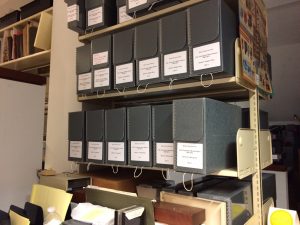The following blog post was written by Paul Paulson, the Burke’s most recent archival student intern. Paul is completing his coursework in the LIS program at Rutgers University, and saw several projects through the archival life cycle during his semester with the Burke. Here are some of Paul’s thoughts on the other side of his internship experience:
This fall I have had the good fortune of working in the archives of the Burke Library at Union Theological Seminary an apply, in a real world environment, what hitherto had only been theoretical. I had the benefit of taking an archiving class concurrent to my work here, which informed much of this experience. Conversely, my time at the Burke gave salience to issues and concerns we investigated in a classroom environment.
I processed a total of four collections which were all rather heterogeneous. The first were the papers of Dr. Christopher Morse, a professor who spent the bulk of his career at Union and who is credited with creating the Bonhoeffer Chair in Theology and Ethics. His papers represent a rather contemporary collection. Along with printed articles and the like were computer diskettes of varying antiquity. Professor Morse’s papers comprised about 12 1/2 boxes of material which were primarily scholarly in nature.

A smaller but no less fascinating collection were the papers of Titus and Fidelia Coan, 18th century missionaries who settled in Hawaii. Titus Coan was very peripatetic, traveling to Patagonia and the Marquesas islands as part of his missionary calling. The papers donated were letters that Titus and Fidelia exchanged between one another. The beauty of the language and the sheer volume of letters the Coans exchanged were quite inspired.
Another small collection that I process belonged to Eitel Proelss, a German born theologian who, like his contemporary Dietrich Bonhoeffer, belonged to the Confessing Church and resisted Nazi influence during WWII. Proelss was sentenced to hard labor but survived the war. Proelss eventually became interested in criminality and began a program at UTS that merged pastoral care with psychology. He also served as the Chaplain of Rikers island for 10 years . His papers offer a glimpse at the thoughts of an individual concerned for well-being of the incarcerated and assured of the redemptive possibilities for criminalized people.
My last collection was that of an individual named Arthur Mason Brown , whose grandfather, Francis Brown, was the seventh president of Union Theological Seminary. Arthur Mason Brown was born and grew up in present day Syria and served in the Navy during World War II. He eventually moved Egypt where he taught at the The American University of Cairo, also preaching at the Maadi Church in Maadi, Egypt. Though he eventually settled in the States, Brown returned to the Middle East for a year in 1971 to teach at the American University in Beirut. In his teaching years he found himself at a number of different institutions in the States, but spent the bulk of his career at Bates College in Maine. It was there that he suffered a devastating stroke which is said to had triggered a crisis of faith in him. After he stopped teaching and preaching, he devoted his energy to Haiku poems, two books of which are included in the collection. Most of Brown’s archival papers are sermons. These are abundant and a number of them exist in several different versions. It was challenging to fix an accurate chronology for them all and hopefully I have done an adequate job of it. There are also photos and the Haikus which provide a welcome contrast to the preponderance of sermons.